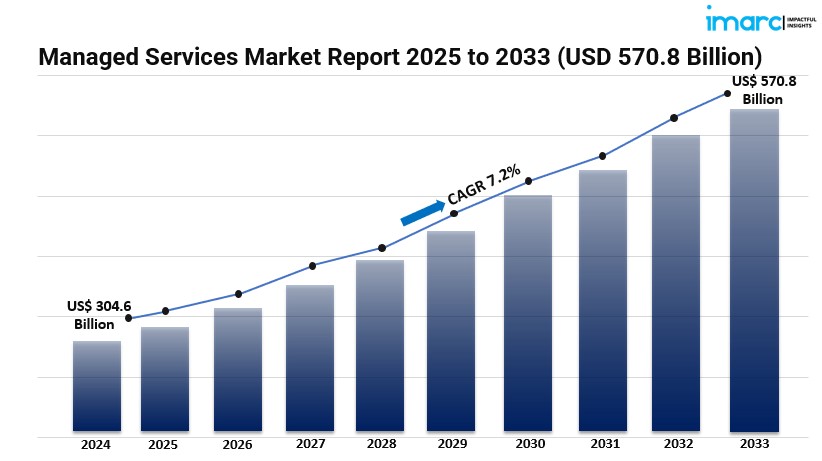
Market Overview
The managed services market was valued at USD 304.6 billion in 2024 and is projected to reach USD 570.8 billion by 2033, exhibiting a Compound Annual Growth Rate (CAGR) of 7.2% during the forecast period. The market is experiencing significant expansion, driven by the increasing demand for cost-effective IT solutions, enhanced cybersecurity measures, and streamlined business operations.
Study Assumption Years
- Base Year: 2024
- Historical Years: 2019-2024
- Forecast Years: 2025-2033
Managed Services Market Key Takeaways:
- North America accounted for the largest market share in 2024, driven by strong technological adoption, an expanding cloud ecosystem, and a robust cybersecurity infrastructure.
- Cloud-based managed services lead the market segment due to growing digital transformation initiatives across industries.
- IT and Telecom sectors hold dominance in market adoption, as enterprises increasingly outsource IT management to focus on core competencies.
- Security and compliance services are witnessing the fastest growth, fueled by escalating cyber threats and stringent regulatory requirements.
For an in-depth analysis, you can request a sample copy of the report: https://www.imarcgroup.com/managed-services-market/requestsample
Market Growth Factors
Rising Demand for Cloud-Based Solutions:
All the businesses today are matching up for a never-demanded flexibility and scalability that cloud service offers and must-surely become a great wall put up against all future complaints. Cloud computings services allow an optimized ability to do operations because they do not require any purchase of expensive hardware but allow access, for a price, when needed. Scalability is pretty much available and lets businesses adopt resources in a flexible manner. Seamless integration with already existent systems minimizes disruption during the migration process. Cloud providers invest high amounts towards data security and provide their extensive measures such as encryption and threat detection. It reduces costs massively; pay-as-you-go outsourcing of it infrastructure opens cloud computing to capital expenditure and operating cost savings. Efficiency, scalability, security, and affordability are the driving forces fueling the ever-increasing demand for solutions based on cloud computing.
Emphasis on Cybersecurity and Compliance:
Indeed, the nature of their attacks has become so sophisticated that corporations must bring in very stringent security measures. Companies are, therefore, making investments in managed security services to secure data as well as maintain compliance with regulations. These managed services are able to provide extremely comprehensive security solutions from continuous monitoring of threats to thoroughly assessing the risk and achieving compliance audits. Apart from that, MSPs can boast unique expertise when it comes to maneuvering through complex security landscapes or staying ahead of developing threats and regulations. This way, the company can concentrate on the core part of its operations, leaving the management of cybersecurity to those experts to mitigate and ensure compliance.
Growing Adoption of AI and Automation:
Managed services are reshaped increasingly by AI and automation. AI-based analytics make service delivery better by scouring heaps of data for recognizable patterns and problems, enabling service personnel to proactively address issues. Routine tasks- such as routing tickets and incident response- are now automated, leaving human agents free for more complex work and saving operational costs. Adding a predictive maintenance technology with AI leads to prediction and intervention of machine failure, thus minimalizing downtime. All these technologies thus optimize performance, streamline workflows, and improve service efficiency.
Cost Efficiency and Operational Optimization:
Cost savings are huge for organizations that opt for outsourcing their IT and other business operations services to MSPs. It is because of the economies of scale achieved by these MSPs to provide services at lower costs than maintaining departments in-house. Flexible, scalable, and tailor-made solutions allow organizations to acquire services according to their needs. They can thus pay only for the services utilized. MSPs impart specialized know-how and best practices, thus resulting in improvement in operational efficiency while allowing a business to focus on its key strategic initiatives. Outsourcing non-core functions enables institutions to optimize resource allocation for productivity gains and innovation.
Market Segmentation
The managed services market is segmented based on service type, deployment mode, enterprise size, industry vertical, and region:
Breakup by Type:
- Managed Infrastructure
Managed Data Center
Managed Security
Managed Communications
Managed Network
Managed Mobility
Breakup by Deployment Mode:
- On-premises
- Cloud-based
Breakup by Enterprise Size:
- Large Enterprises
- Small and Medium-sized Enterprises
Breakup by End Use:
- IT and Telecommunication
- BFSI
- Healthcare
- Entertainment and Media
- Retail
- Manufacturing
- Government
- Others
Regional Insights
- North America (United States, Canada)
- Asia Pacific (China, Japan, India, South Korea, Australia, Indonesia, Others)
- Europe (Germany, France, United Kingdom, Italy, Spain, Russia, Others)
- Latin America (Brazil, Mexico, Others)
- Middle East and Africa
Recent Developments
The managed services market is growing rapidly, driven mainly by innovations in technology and emerging business needs. The use of AI-based automation has steadily increased to streamline operations and ensure effective service operations. Another solution that many organizations adopt is the zero-trust security model to meet the growing demand for enhanced data protection against increasing cyber threats. Hybrid cloud capabilities also continue to enjoy good patronage, as they offer the flexibility and scalability of joining on-premises infrastructure with cloud resources. Investment in advanced analytics and predictive maintenance is tremendously huge by organizations to further enhance service quality, efficiency, and minimal downtime. The competitive landscape is dramatically altered by strategic alliances and mergers, enabling market players to expand their service portfolios, reach new markets, and strengthen overall market presence. The situation offers fertile ground for innovations to thrive and thus evolve managed services.
Key Players
The competitive landscape of the medical power supply market features several prominent companies dedicated to innovation and quality. Key players in this sector include:
Accenture plc, AT&T Inc., Capgemini SE, Cisco Systems Inc., Dell Technologies Inc., Fujitsu Limited, Infosys Limited, International Business Machines Corporation, Nokia Corporation, Rackspace Technology Inc., Tata Consultancy Services Limited, Telefonaktiebolaget LM Ericsson, Verizon Communications Inc., Wipro Limited, etc.
If you require any specific information that is not covered currently within the scope of the report, we will provide the same as a part of the customization.
About Us:
IMARC Group is a global management consulting firm that helps the world’s most ambitious changemakers to create a lasting impact. The company provides a comprehensive suite of market entry and expansion services. IMARC offerings include a thorough market assessment, feasibility studies, company incorporation assistance, factory setup support, regulatory approvals and licensing navigation, branding, marketing and sales strategies, competitive landscape, and benchmarking analyses, pricing and cost research, and procurement research.

0 Comments
Post Comment